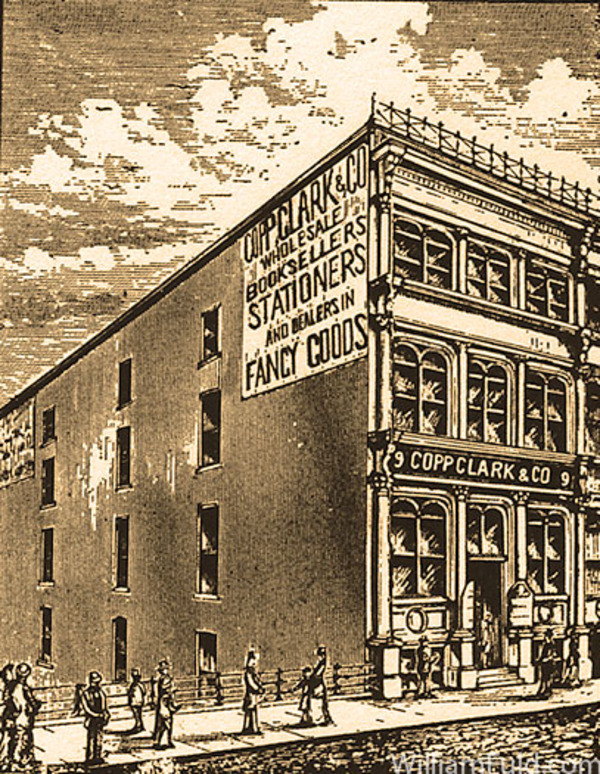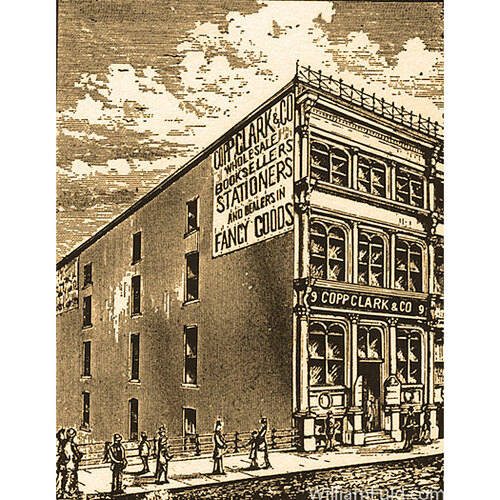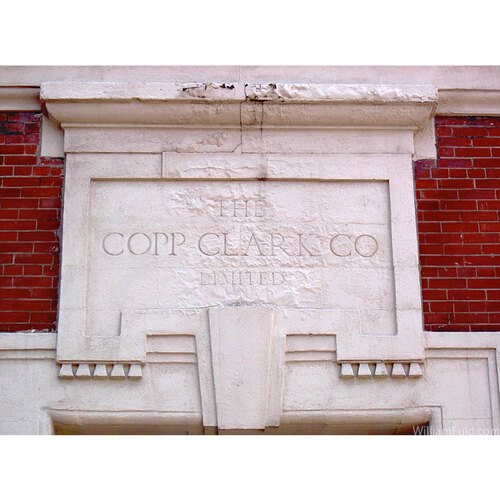
Source: Link
COPP, WILLIAM WALTER, bookseller and publisher; b. 18 Nov. 1826 in Great Torrington, England, son of William Copp and Frances Cock; m. 27 Aug. 1850 Caroline Ann Thomas in Toronto, and they had four daughters and one son who survived childhood; d. there 20 Aug. 1894.
William Walter Copp’s father was a carpenter in Great Torrington, Devon, possibly employed by his father-in-law, a prominent local builder, who was responsible for the new parish church steeple erected in 1830. William was the second child and eldest son, and several more children were born to his parents before they immigrated to Upper Canada in 1842, settling in Toronto. Soon after their arrival, young William began work as an “in-door apprentice” to bookseller and publisher Hugh Scobie*. According to a profile of Copp published in 1891, the book trade was particularly slow in the 1840s and, having put in whole days “without a single sale being made,” he “thought seriously of going to Australia.” He stayed with Scobie, however, until 1853, when, at his employer’s death, he was able to buy a share in the business.
In Great Torrington the Copps had been members of the Church of England, but in May 1844 William’s parents joined the Congregational (later Zion) Church [see John Roaf*]. In December 1847 William was himself received into fellowship. He was to remain an active Congregationalist throughout his life. At church he would have met Caroline Ann Thomas, his future wife, whose family were also members. Caroline’s brother, George Elliot Thomas, was a printer, later in business with Copp, and his grandsons were to own Copp’s firm in the 20th century.
In January 1854 Copp, in partnership with Thomas Maclear and William Cameron Chewett, purchased parts of Scobie’s business from his widow, Justina (his newspaper, the British Colonist, went to Samuel Thompson*). Although Copp was the junior partner in Maclear and Company, his nearly 12 years’ practical experience must have given him a position of considerable responsibility. Maclear withdrew from the partnership in 1857, but Copp and Chewett continued under the old name until 1 July 1861, when the firm became W. C. Chewett and Company. They carried on the diverse business built up by Scobie as printers, publishers, bookbinders, stationers, and booksellers. By 1869 Chewett himself had retired, and Copp had become the senior partner in a new firm, Copp, Clark and Company.
Henry James Clark, who was several years older than Copp, had been a dry-goods merchant in his native London, England, before turning unsuccessfully to bookselling. In 1855 he came to Toronto, where he was hired as a bookkeeper at Maclear and Company. Like Copp, he was a Congregationalist. He joined the Toronto church soon after his arrival, and it may have been this connection that led to his employment at Maclear’s. Throughout his long career in the book trade Clark was active in many causes: temperance reform (an interest he shared with another Toronto publisher, George Maclean Rose), the early closing movement, and Sunday school work. In 1867–68, together with Copp, G. E. Thomas, and others, he was a founder of the Northern Congregational Church. An association in business and church life over more than 35 years must have brought these two men very close together.
In 1873 Copp and Clark sold their retail business to concentrate on printing, publishing, and the wholesale trade. Their best-known publication was undoubtedly the annual Canadian almanac, begun by Scobie in 1848. Important scientific and anthropological titles, including works by John William Dawson, Sandford Fleming*, Casimir Stanislaus Gzowski, Adrien-Gabriel Morice*, and Sir Daniel Wilson, appeared with the Copp, Clark imprint, a result perhaps of the firm’s printing work for the Canadian Institute. Map printing and publishing, a specialty since the time of Scobie, was greatly stimulated by the development of northern Ontario in the latter part of the century. The expansion of the free school system in Ontario throughout the 1860s and the increasing emphasis on the use of locally produced and authorized textbooks in the province’s schools gave Copp, Clark the opportunity to develop in another field in which the company had been active under the Chewett name. In October 1868 the firm submitted for approval by the Council of Public Instruction [see Henry James Grasett*] an arithmetic adapted for Canadian schools, and educational publishing – from public school readers to college texts – soon accounted for a major part of the Copp, Clark output. The company also sold school supplies of all kinds through the wholesale trade. By the early 1890s the solid base built up in textbooks enabled Copp, Clark to expand into the publishing of Canadian and foreign literature. Before the end of the century the company would publish works by novelists Robert Barr and Horatio Gilbert Parker* and poets William Bliss Carman*, Emily Pauline Johnson*, and Charles George Douglas Roberts*.
According to a contemporary account, Copp “devoted himself more to the financial duties of the house” while Clark had the “general oversight of business.” The printing plant was managed by Charles Fuller, an experienced lithographer whose business had been acquired by Chewett’s in 1862. In December 1885 the Copp, Clark Company Limited was incorporated and three younger men were brought in: Copp’s son, William; his wife’s nephew, Arnold William Thomas; and Henry Leggatt Thompson, a long-time employee who was to succeed Copp as president in 1894.
By 1873 Copp had acquired a triple lot on Isabella Street, where he built a large house and cultivated roses that were celebrated in the community. He was a deacon and trustee and the treasurer of the Northern Congregational Church, a member of the National Club from 1878 [see William Alexander Foster*], and a member of the board of trade. In the 1880s he travelled to England frequently on business, and during an extended visit to London in 1886 he and his wife were invited to the reception ball of the Colonial and Indian Exhibition, held at the Guildhall. In 1891 the trade journal Books and Notions chose him as the first subject in its series “Men of the Times,” remarking that he had worked in the book trade for nearly half a century. During his lifetime Canadian publishing had evolved from small newspaper offices into a modern industry. With the deaths of Clark in 1892 and Fuller and Copp in 1894, an era seemed at an end. Prominent members of the trade gathered at Copp’s funeral to honour the head of an important Canadian publishing house and “a man who left behind him only pleasant memories and no enemies.”
Details concerning the Copp family were provided by family memorabilia in the possession of Mrs Beverley Copp Alkerton of Ancaster, Ont., a great-granddaughter of the subject.
AO, RG 2, C-5; D-9-A. Baker Library, R. G. Dun & Co. credit ledger, Canada, 26–27. Great Torrington Parish Church (Great Torrington, Eng.), Reg. of baptisms, marriages, and burials, 1789–1845. UCC-C, Zion Church (Toronto), minutes of meetings, vols.1–2. “The late Henry J. Clark,” Books and Notions (Toronto), 8 (April 1892): 8. “Men of the times: Mr. W. W. Copp,” Books and Notions, 7 (July 1891): 6. Northern Congregational Church, Manual (Toronto), 1875 (copy in MTRL). Globe, 8 March 1892, 21 Aug. 1894. Dict. of Toronto printers (Hulse). G. L. Parker, The beginnings of the book trade in Canada (Toronto, 1985).
Cite This Article
Elizabeth Hulse, “COPP, WILLIAM WALTER,” in Dictionary of Canadian Biography, vol. 12, University of Toronto/Université Laval, 2003–, accessed February 27, 2026, https://www.biographi.ca/en/bio/copp_william_walter_12E.html.
The citation above shows the format for footnotes and endnotes according to the Chicago manual of style (16th edition). Information to be used in other citation formats:
| Permalink: | https://www.biographi.ca/en/bio/copp_william_walter_12E.html |
| Author of Article: | Elizabeth Hulse |
| Title of Article: | COPP, WILLIAM WALTER |
| Publication Name: | Dictionary of Canadian Biography, vol. 12 |
| Publisher: | University of Toronto/Université Laval |
| Year of publication: | 1990 |
| Year of revision: | 1990 |
| Access Date: | February 27, 2026 |




